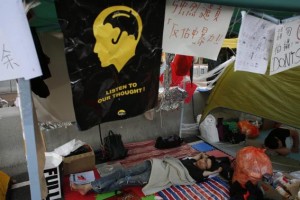
(Reuters) – Hong Kong student protesters said on Friday they were determined to maintain their campaign for full democracy, undaunted by the city government’s rejection of talks aimed at defusing a standoff that has shaken communist China’s capitalist hub.
The government’s decision to call off the talks with the students scheduled for Friday came as democratic lawmakers demanded anti-graft officers investigate a $6.4 million business payout to the city’s pro-Beijing leader while in office.
The city’s chief secretary, Carrie Lam, said the talks were off because of the students’ unswerving demands for universal suffrage, which she said was not in accordance with the city’s mini-constitution, and what she described as their illegal occupation of parts of the city and calls for people to rally.
Several hundred protesters were camped in the heart of the financial center early on Friday, with many expecting crowds to swell later on Friday and over the weekend in response to the government’s stand.
“For sure it will be jam packed with people later today in Admiralty after people get off work and students finish school,” said Joshua Wong, a thin, 17-year-old who heads the group Scholarism that represents secondary school pupils.
The students’ main protest site has been in Hong Kong’s central Admiralty district. Wong said a rally was scheduled to begin there at 7.30 a.m. ET.
China’s Communist Party leaders rule the former British territory through a “one country, two systems” formula which allows wide-ranging autonomy and freedoms not enjoyed on the mainland and specifies universal suffrage as an eventual goal.
But Beijing ruled on Aug. 31 it would screen candidates who want to run for the city’s election for a chief executive in 2017, which democracy activists said rendered the notion of universal suffrage meaningless.
Scenes of tear gas wafting between some of the world’s most valuable buildings, violent clashes, mass disruptions to business and commuter chaos over the past two weeks have underscored the challenges Beijing faces in imposing its will on Hong Kong.
‘PAIN FOR GAIN’
Protest numbers have dwindled to just a few hundred people at sites around the city, but activists have managed to keep up their blockade of some major roads, to the frustration of some city residents.
“This is something we have to do when we are young. It’s a process of short-term pain for long-term gain,” John Wong, an 18-year-old university student.
One student leader said the protesters would consider lifting their blocks on some roads if the government let them use Civic Square, a grassy area next to government headquarters in Admiralty, media reported.
The protesters’ supply stations appeared to be well stocked on Friday with biscuits, cereal and water, underscoring their determination to sit it out until the government responds to their demands.
While the largely young crowds sit it out on the streets, their democratic lawmaker allies are stepping up pressure on the city government.
On Thursday, they threatened to veto some government funding applications, although none that affect people’s daily lives, as they step up their civil disobedience campaign and try to paralyze government operations.
The students are also calling for Hong Kong leader Leung Chun-ying to resign.
Hong Kong’s Justice Department on Thursday handed to prosecutors the investigation into the business payout to Leung by an Australian engineering company.
Australia’s Fairfax Media reported this week that engineering firm UGL Ltd paid Leung a total of $6.4 million in 2012 and 2013 in relation to its acquisition of DTZ Holdings, a property consultant that employed Leung as its Asia Pacific director before he took office in July 2012.
Leung’s office denied any wrongdoing. DTZ was not immediately available to comment, while UGL said it was under no obligation to disclose the agreement.
(Additional reporting by Kinling Lo and Anne Marie Roantree; Writing by Robert Birsel; Editing by Clare Baldwin)







